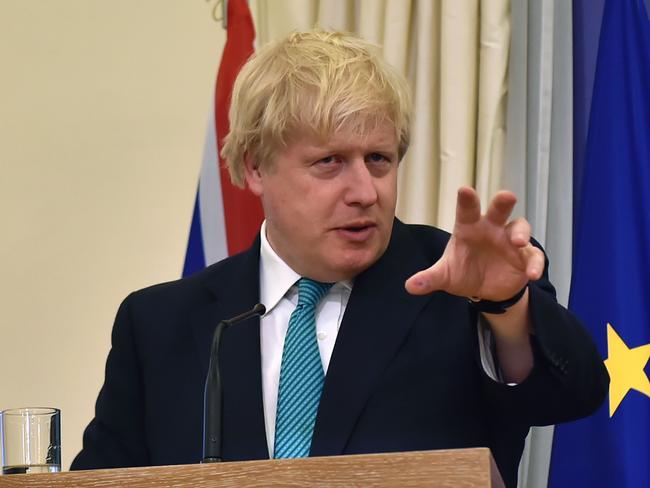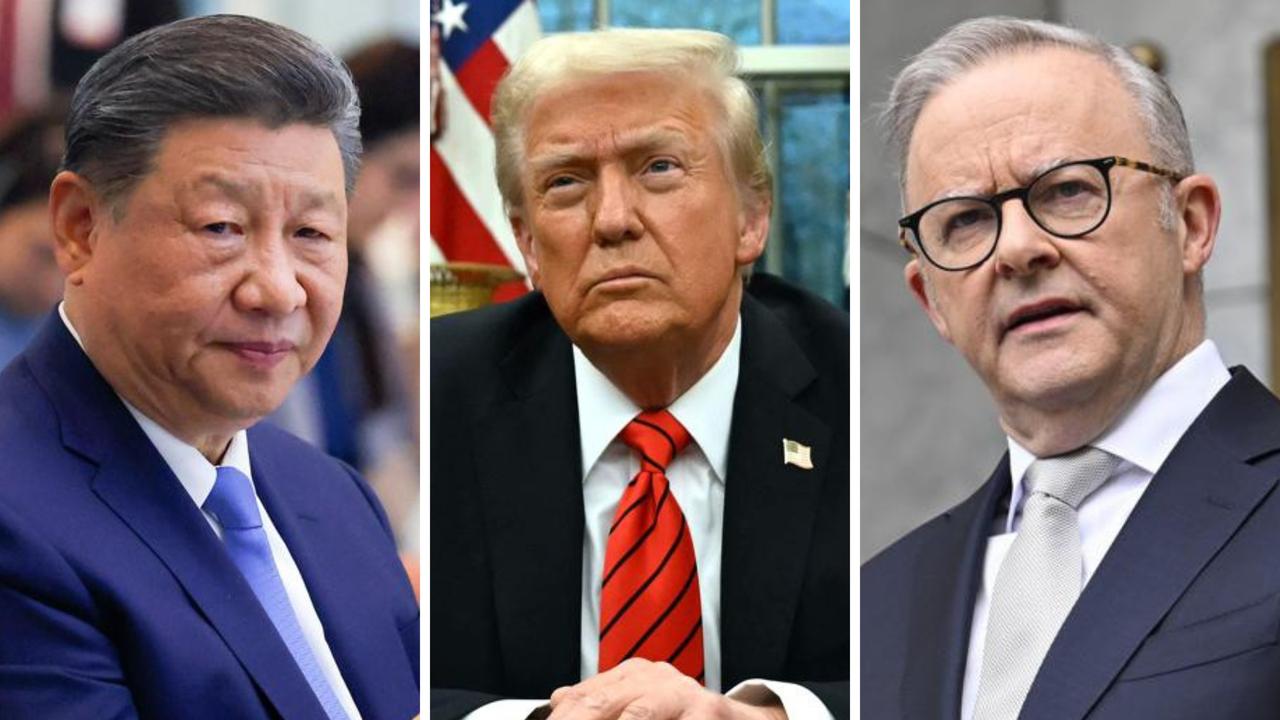Donald Trump’s aircraft carrier sailed away from Korean Peninsula
VISITING a navy base in Tokyo, US Vice President Mike Pence has delivered a rousing speech on North Korea, warning the US is prepared to fight fire with fire.
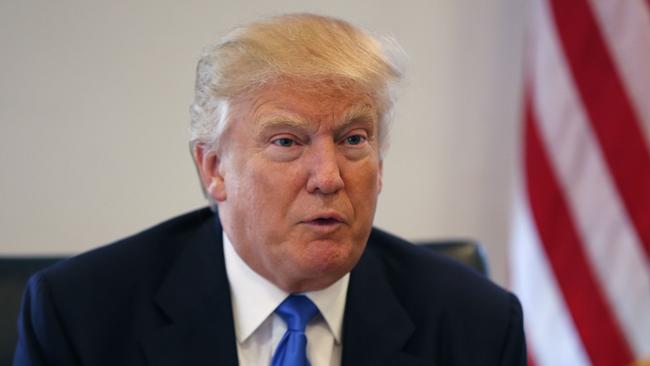
FROM the windswept deck of a massive aircraft carrier, Vice President Mike Pence proudly told sailors at a naval base in Tokyo that America’s “shields stand guard” and the “swords ready”.
Amid rising nuclear tensions with North Korea, Mr Pence warned the US would make an “overwhelming and effective” response to any use of conventional or nuclear weapons.
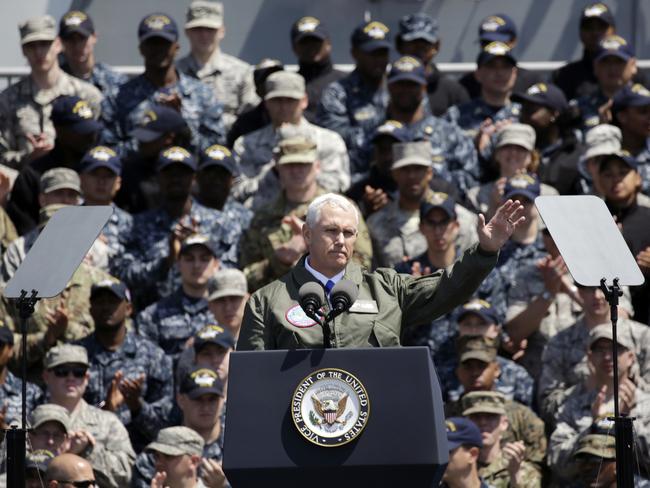
Dressed in a green military jacket aboard the hulking USS Ronald Reagan, Pence said that President Donald Trump’s administration would continue to “work diligently” with allies like Japan, China and other global powers to apply economic and diplomatic pressure on Pyongyang.
But he told the sailors, “as all of you know, readiness is the key”.
The United States will always seek peace, but under President Trump, the shield stands guard and the sword stands ready. #VPinASIA pic.twitter.com/5LiiIkIhXz
— Vice President Pence (@VP) April 19, 2017
“The United States of America will always seek peace but under President Trump, the shield stands guard and the sword stands ready,” Pence told 2500 sailors dressed in blue fatigues and Naval baseball caps on a sunny, windy morning aboard the carrier at the US Yokosuka naval base in Tokyo Bay.
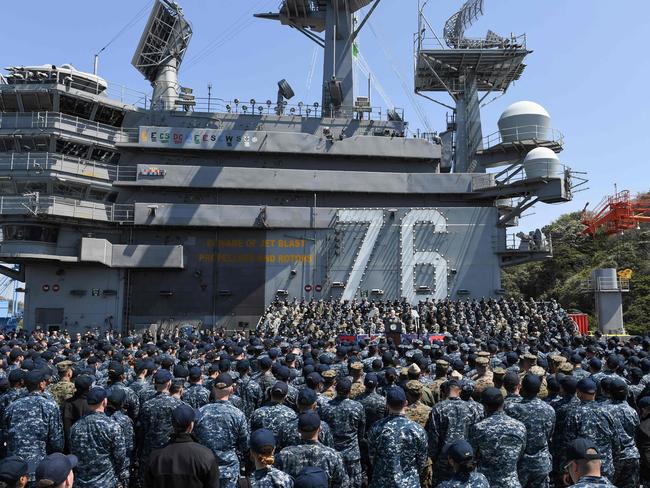

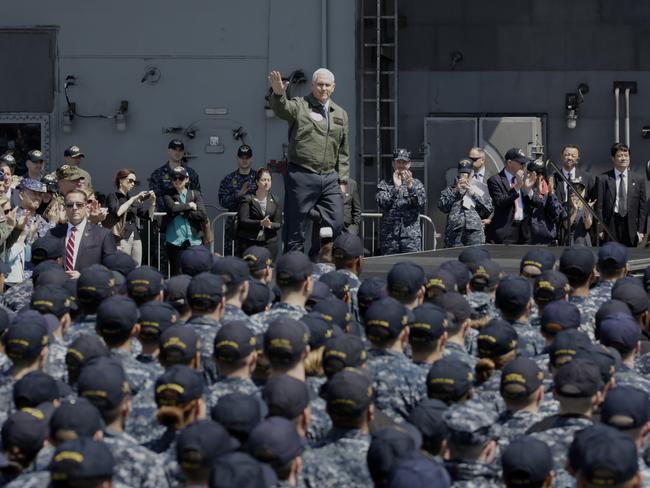
“Those who would challenge our resolve or readiness should know, we will defeat any attack and meet any use of conventional or nuclear weapons with an overwhelming and effective American response,” Pence said.
Pence also said the US would protect freedom of navigation in the South China Sea, the sea lanes vital to global shipping where China has been staking claim to disputed territory.
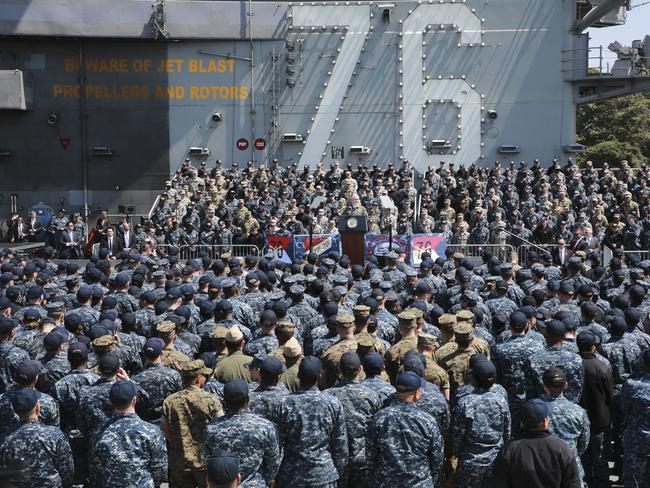
TRICKY TRUMP PULLS MASTER BLUFF
THE US is being hailed for a manoeuvre against North Korea that has been described as an elaborate game of “psychological warfare”.
A US defence official has admitted an aircraft carrier the Navy had said was steaming towards the Korean Peninsula amid rising tensions actually sailed in the opposite direction.
The Navy on April 8 said it was directing a naval strike group headed by the USS Carl Vinson supercarrier to “sail north” as a “prudent measure” to deter North Korea’s nuclear regimen.
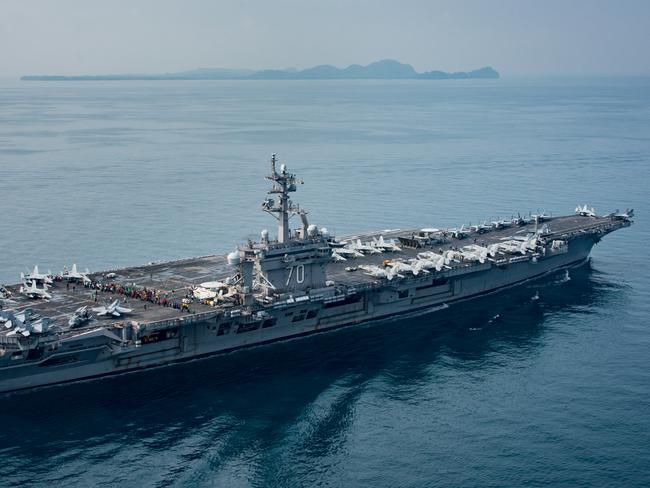
Pentagon chief Jim Mattis on April 11 said the Vinson was “on her way up” to the peninsula and President Donald Trump the next day said: “We are sending an armada. Very powerful.”
RELATED: Trump poised to strike North Korea
But a defence official on Tuesday told AFP that the ships remained off the northwest coast of Australia. A Navy photograph showed the Vinson off Java over the weekend.
“They are going to start heading north towards the Sea of Japan within next 24 hours,” the official said on condition of anonymity.
The official added that the strike group wouldn’t be in the region before next week at the earliest — it is thousands of nautical miles from the Java Sea to the Sea of Japan.
Cai Jian, an expert from the Center for Korean Studies at Fudan University in Shanghai, told the Washington Post the whole episode was part of an elaborate game of “psychological warfare or bluffing” by the United States.
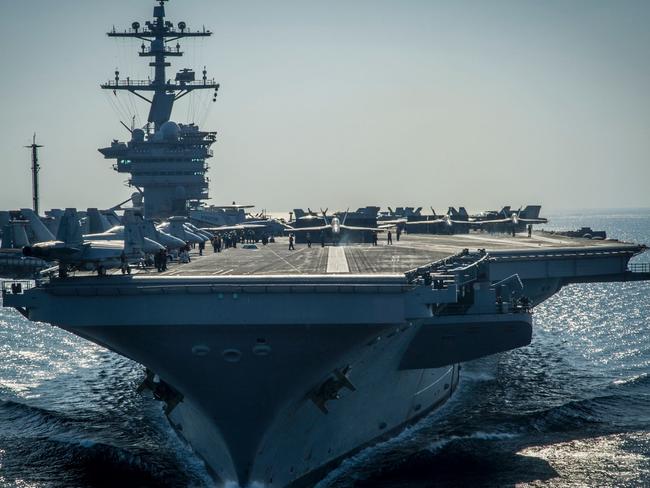
“At the peak of the standoff, psychological warfare is very important,” he told the Times, adding Washington never really intended to launch a military strike against North Korea.
AMERICA VS NORTH KOREA: What now?
At the time of the strike group’s deployment, many media outlets said the ships were steaming toward North Korea, when in fact they had temporarily headed in the opposite direction.
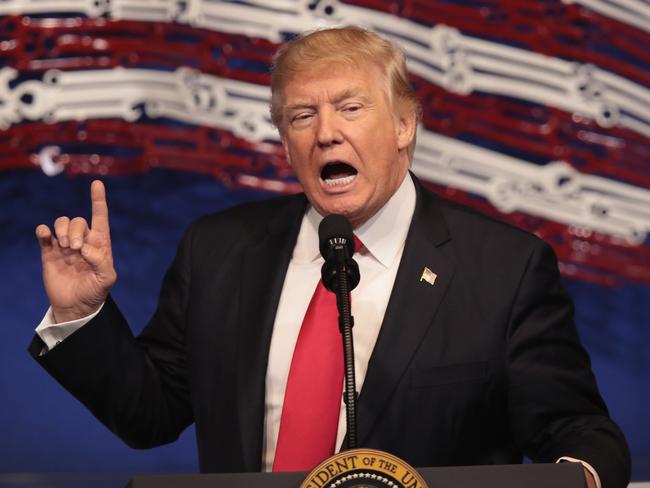
The New York Times reported the carrier strike group had headed south to take part in joint exercises with the Australian Navy in the Indian Ocean.
According to the Times, a string of events – from a premature announcement of the deployment by the military’s Pacific Command to an erroneous explanation by Mattis – perpetuated the false narrative that the armada was racing towards North Korea.
RELATED: US teeters on the brink of war with North Korea
TRUMP PRAISES XI
It came as Mr Trump praised China for its help in pressuring North Korea, while defending his softening stance on trade and other issues with the Asian giant.
In the comments to Fox News, Mr Trump cited the strength of his new-found relationship with President Xi Jinping in explaining why he has dropped his past criticism of China.
“Now, what am I going to do? Start a trade war with China while in the middle of him working on a bigger problem, frankly, with North Korea?” he said, speaking on the sidelines of the annual White House Easter egg roll.
EXCLUSIVE: @ainsleyearhardt asks @POTUS where he stands on North Korea, China and illegal immigration. pic.twitter.com/PeHFP9aw46
— Fox News (@FoxNews) April 18, 2017
He continued: “So, I’m dealing with China with great respect. I have great respect for him. Now, we’ll see what he can do. What am I going to do? In the middle of him talking with North Korea I’m going to hit them with currency manipulation? This is the fake media that just does a number.
“Think of it. He’s working so nicely. Many coal ships have been sent back, fuel has been sent back. They’re not dealing the same way. Nobody’s ever seen it like that. Nobody’s ever seen such a positive response on our behalf from China.”
The turning point in Mr Trump’s relationship with China appears to have come when he met with President Xi at his Mar-a-Lago estate in Florida on April 6-7.
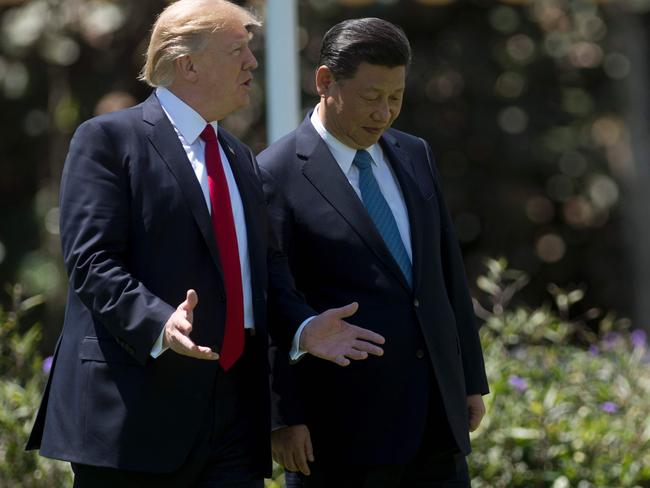
During the US presidential campaign, Mr Trump harshly attacked Beijing as a currency manipulator and threatened to slap 45 per cent tariffs on Chinese imports.
Since taking office, however, US tensions with North Korea have soared amid a drumbeat of missile tests and fears Pyongyang may be readying a sixth nuclear test.
US experts believe that only China has sufficient economic and political leverage to restrain Pyongyang’s drive to develop a long-range missile capable of hitting the US mainland with a nuclear warhead.
NORTH KOREA ‘RECKLESSLY TRIED TO PROVOKE’
US Defence Secretary Jim Mattis says North Korea’s latest failed missile launch was a reckless act of provocation.
He commented on the weekend missile launch in an interview with reporters travelling with him on Tuesday to Saudi Arabia, where he begins a week-long Mideast tour.
His language was stronger than in an initial written statement he issued shortly after the launch, in which he simply said he was aware of the failure.
“The leader of North Korea again recklessly tried to provoke something by launching a missile,” he said.
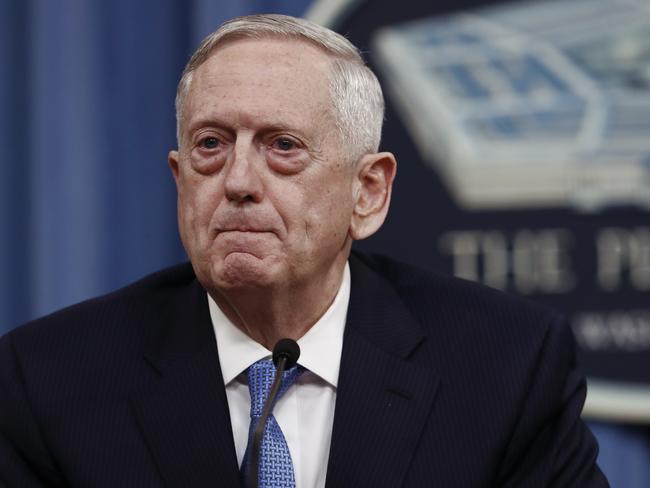
General Mattis did not identify the type of missile but said it was not of intercontinental range, meaning it could not reach US territory. He did not comment on what might have caused the missile to fail.
General Mattis credited China with trying to help get the North Korea situation “under control” with the goal of denuclearising the Korean Peninsula.
Asked about his visit to Saudi Arabia, General Mattis said the desert kingdom is a “pillar of our security framework for the region.”
The US military is providing support for a Saudi-led coalition fighting anti- government Houthi rebels, but General Mattis said the US focus is on arranging a United Nations-brokered negotiating team to resolve Yemen’s civil war diplomatically.
“This is something, with the number of innocent people dying inside Yemen, that simply has to be brought to an end,” he said.
The US security alliance with Saudi Arabia, dating to 1944 and based largely on the Saudis’ oil riches, has made Washington the kingdom’s most important arms supplier.
‘CAN’T BE COMPLACENT ON NORTH KOREA’
British Foreign Secretary Boris Johnson said no-one can be complacent about the potential threat posed by the missiles being developed by North Korea.
“The regimen is now developing intercontinental ballistic missiles which would be capable of delivering a nuclear strike on the mainland United States. These weapons have not yet been fully tested but no one can be complacent about the potential threat they pose,” Mr Johnson told parliament on Tuesday.
He also said he had spoken to his Chinese counterpart on Monday and urged him to use Beijing’s influence to restrain North Korea.
It comes after North Korea’s Vice Foreign Minister Han Song-Ryol told the BBC that Pyongyang would continue to test missiles on a “weekly, monthly and yearly basis”.
